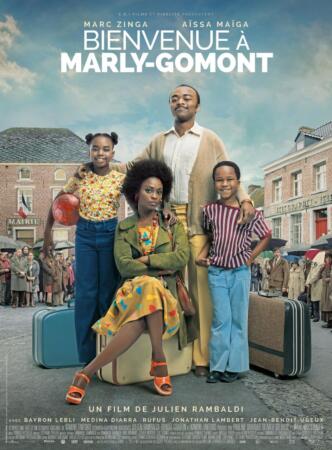
We cover many foreign films and TV series that are rarely ever formally released in the USA; I’m glad that streaming platforms like Netflix and Amazon occasionally pick up some of these titles for American audiences. Ideally, there’d be a one-stop online service for global African diaspora films and TV shows that interested viewers all over the world would have access to, soon after they premiere in their native countries. But maybe that’s something that will eventually become a reality some time in the future.
One of those foreign titles previously profiled on this blog is a French dramedy titled “Bienvenue à Marly-Gomont” (“Welcome to Marly-Gomont”), which stars French-Malian-Senegalese actress Aïssa Maïga – an actress who may not yet be a name most Americans are familiar with, but readers of this blog over the years should hopefully recognize her name and/or face, as we’ve covered many of the films she’s made since this blog was launched.
The film was released in France in the spring, and is just one of 4 films Maïga stars in that are scheduled to premiere in French theaters over the next 12 months.
The film’s synopsis reads: In 1975 Kinshasa, Seyolo Zantoko, fresh out of medical school, seizes the opportunity to take an open position for a doctor in a small French village called Marly-Gomont. Moving there, Seyolo and his family quickly find themselves disillusioned. The isolated white Marly-Gomont population have never seen black people before in their lives, so you can imagine what happens next, as Seyolo, undeterred by all the uncertainties that surround him and his family, remains determined to succeed in his new post, and win the villagers over.
Marc Zinga, who starred in Abd Al Malik’s 2014 critically-acclaimed drama, “May Allah Bless France!,” stars in “Marly-Gomont” as Seyolo, while Maïga plays his wife, Anne Zantoko.
Julien Rambaldi directs the film.
This kind of “racial comedy” isn’t unusual in *new* French cinema; we’ve covered French films like this in the recent past, so I can’t say there’s anything particularly fresh about the story, except that it is inspired by a true story, and it’s more of a “period piece” since it’s set in 1975. Another French dramedy profiled on this blog recently – “Il a déjà tes yeux” (“He Even Has Your Eyes”), which also co-stars Maïga – also very much falls under the “racial comedy” umbrella; seemingly harmless, but, in a country like France that is apparently becoming even more intolerant (although I suppose we could say that about other parts of the world), you have to wonder where films like these land in the bigger picture, how they’re received, what their messages or intentions are, and whether they have any influence/impact on the status quo (if they are meant to). I’d like to hear from our readers in France to provide some further context and enlighten the rest of us.
All that said, I’m a fan of Aïssa Maïga’s work, and Marc Zinga – who I wasn’t familiar with before I saw him in “May Allah Bless France!” – impressed me with his ability in that film, which was a drama. So he gets to flex his comedy muscle here. And I hope to see even more of them on screen, whether in French-produced films or elsewhere.
“Bienvenue à Marly-Gomont” (“Welcome to Marly-Gomont”) is now streaming on Netflix in the USA, but under an uninspired, much less interesting title, “The African Doctor.” The original English translation, “Welcome to Marly-Gomont,” would’ve worked just fine. So look for it on Netflix and add it to your queue.
A trailer for the French release of “Bienvenue à Marly-Gomont” (“Welcome to Marly-Gomont”) follows below; although it’s without English subtitles, but the images are hopefully enough to tell you what’s going on. The Netflix release obviously comes with English subtitles!

